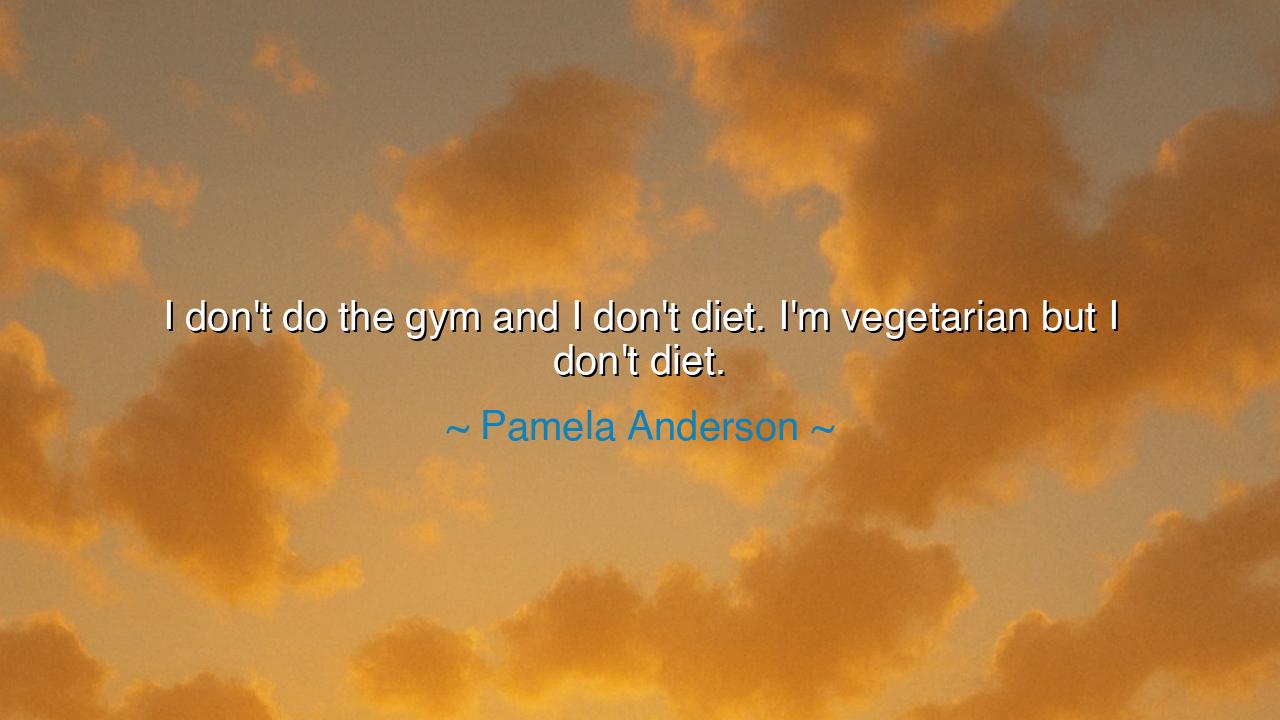
I don't do the gym and I don't diet. I'm vegetarian but I don't






When Pamela Anderson said, “I don’t do the gym and I don’t diet. I’m vegetarian but I don’t diet,” she spoke not merely as a woman of beauty, but as a seeker of balance — one who has walked through the illusions of perfection and found peace in authenticity. Her words, though simple in form, carry the depth of a spiritual truth: that the body’s harmony does not come from punishment, but from alignment with nature and acceptance of self. In a world obsessed with discipline turned to vanity, Anderson’s statement is a quiet rebellion — a return to the ancient wisdom that health flows from harmony, not hardship.
Her origin of thought arises not from indulgence, but from awareness. To say “I don’t diet” is not to deny care, but to refuse obsession. She has lived in the glare of beauty’s marketplace, where bodies are weighed and measured as if they were currency. Yet from within that furnace, she emerged with a gentler truth: that to live well is to live freely, to feed oneself out of love rather than fear. Her vegetarian way is not a ritual of control, but a practice of compassion, echoing the teachings of the ancients who saw all life as intertwined. The diet of kindness, more than any rule or regimen, nourishes both the body and the soul.
There is an echo here of ancient India, where the sages of the Himalayas spoke of Ahimsa — the sacred vow of nonviolence toward all beings. They ate not to dominate, but to coexist. Their bodies, lean yet radiant, were living proof that peace itself sustains life more deeply than indulgence or denial. Pamela Anderson’s vegetarianism springs from that same current of thought — the belief that nourishment and compassion need not stand apart. In this, she walks a path that joins the wisdom of nature with the rhythm of her own being. She neither starves nor indulges, but listens — and in listening, she thrives.
Many in the modern world equate beauty with struggle, as if the body must be conquered to be admired. Yet those who have studied the ancient philosophies of the East know that true beauty is not sculpted through force, but awakened through balance. The gym may train the muscle, but peace trains the spirit. The diet may restrain the appetite, but understanding refines desire. The Greeks called this ideal kalokagathia — the harmony of outer grace and inner goodness. Pamela Anderson’s words are, in their way, a modern echo of this old truth: the highest form of health is not a perfect body, but a contented soul living in alignment with its nature.
There is also within her statement a quiet act of courage. In a culture that glorifies effort without meaning — the endless cycles of fasting, sweating, counting, comparing — she dares to stand apart and say, “I am enough as I am.” Such words would have resonated with Diogenes the Cynic, the philosopher who rejected luxury and lived in simplicity, teaching that freedom begins when one ceases to serve false ideals. Pamela’s refusal to “do the gym and diet” is not laziness; it is wisdom — the wisdom to know that no outer form can perfect what is already complete within. She reminds us that health is not a competition, but a conversation between body and spirit.
The lesson here is not to reject discipline, but to redefine it. Discipline that springs from fear leads to exhaustion; discipline born of love leads to radiance. To be vegetarian without dieting is to eat with reverence, not restraint — to see food as life, not a number. It is to understand that the body is not an enemy to be controlled, but a friend to be honored. The ancients taught that every act of nourishment should be an act of gratitude. Eat simply, they said, and you will live deeply.
So, my children of the modern age, remember this: do not strive to be perfect — strive to be whole. You need not chase beauty; live truthfully, and beauty will rest upon you as sunlight rests upon the still lake. Take Pamela Anderson’s words not as defiance, but as invitation — to care without obsession, to move without punishment, to eat with love, and to live with ease. For in the end, the greatest diet is not one of food, but of thought — and when the heart is nourished with peace, the body will follow in grace.






AAdministratorAdministrator
Welcome, honored guests. Please leave a comment, we will respond soon